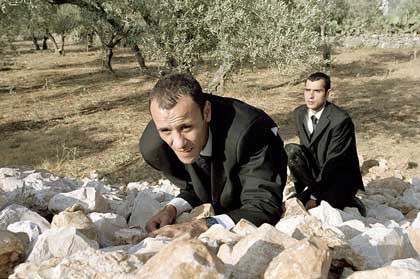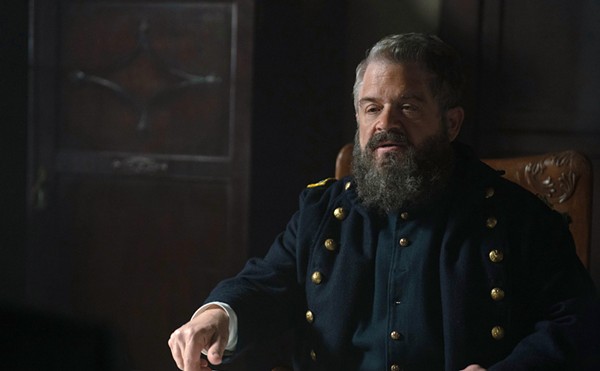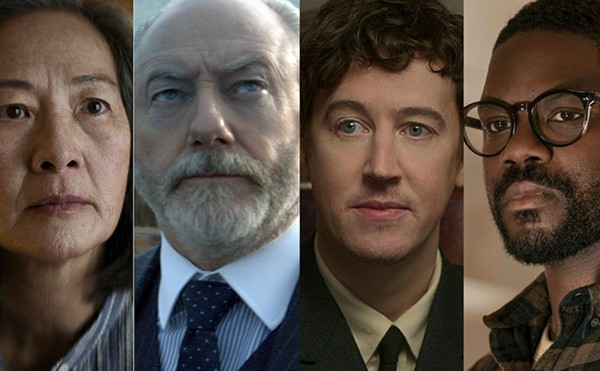Hany Abu-Assad wants to know what makes suicide bombers tick
“The most horrible thing about these stories is there is an action everyone looks to, but you don’t know anything about beforehand. Nothing,” writer-director Hany Abu-Assad says of suicide bombers, the subject of his new film, Paradise Now. “This is why we make movies. We want to discover stories we weren’t told before.”
The Dutch-schooled Palestinian Abu-Assad has a smoky, heavily accented voice and fumbles with his English as often as he evades questions about the controversy one might expect to surround a film that humanizes two West Bank suicide bombers on their way to murder as many of their Israeli occupiers (military and civilian) as they possibly can.
| Saïd (Kais Nashef) and Khaled (Ali Suliman) portray young West Bank men who are recruited to be suicide bombers for the Palestinian cause in Paradise Now. |
“In the beginning, I didn’t know it would be controversial because it’s a phenomenon that exists,” he says. “It’s a reality and you’re curious. You want to know more about it. You want to experience it in a picture, in a drama. It intrigues you to know more about it.”
Palestinian Saïd (brilliant newcomer Kais Nashif) is an introvert haunted by family disgrace. On the day his best friend and co-worker Khaled (Ali Suliman) is fired, they are both contacted by members of an unnamed militant group who have the best of news for them: The friends have been chosen to become martyrs the next day in a suicide-bombing operation. What follows is an eerie last night with their families; Khaled’s is oblivious, but Saïd’s mother knows something is wrong. The friends, however, can reveal nothing. Before sunrise, Saïd sneaks away to visit a crush, Suha (Lubna Azabal), whose father is a great hero of the Palestinian resistance, though she opposes violence and believes peaceful means can be used to secure her country’s freedom.
The next day, Saïd and Khaled are taken to a building where they are fitted for suits, barbered, and given the opportunity to record martyr videos in which they say farewell to their families and declare why they are undertaking this suicide mission. It’s a moment fraut with anguish over what is being lost and punctuated by humor found in the characters’ nervousness.
“You can say to me, I want to buy your car, but as long as you didn’t sign there is no proof,” Abu-Assad says of the scene. “But when you say to the camera, I am going to commit suicide actions, then there’s proof. It’s a turning point, because the character knows there is no way back now.”
| “But when you say to the camera, I am going to commit suicide actions, then there’s proof. It’s a turning point.” – Hany Abu-Assad |
“What happens afterwards?” Khaled asks heroic resistance leader Abu-Karem (Ashraf Barhoum) as he is fitted with a girdle of plastic explosives. “Two angels will pick you up,” Abu-Karem assures him. “Are you sure?” The leader doesn’t hesitate: “Absolutely.” Abu-Karem’ faith and his adoration for the martyr’s cause is so great, in fact, when he says, “We are proud of you,” you believe this man and others like him will weep after Saïd and Khaled detonate themselves.
The operation doesn’t go as planned, though. After the friends crawl into Israel through a hole in a security fence, a passing Israeli vehicle sends them scurrying back into Palestine. Quickly separated, Khaled is able to return to the militant group’s headquarters while Saïd, confused and frightened, decides to complete his half of the mission. This leads to one of the film’s most tension-filled moments, as he stands at the door to an Israeli bus filled with civilians, fingering the cord that will detonate the explosives. Hitchcock’s carefully choreographed scenes never terrified like this one. Unable to go through with it, Saïd retreats again across the border where he goes to Suha’s house and shares his first kiss with her.
“The tragedy of Saïd is that his father, in order to give a better life for his family, he collaborated with the enemy and was executed by the resistance,” Abu-Assad explains. “Then the son, in order to protect his family from this guilt, he kills himself for that. But then this guilt becomes bigger because of the kiss — why? Her father is a hero, but his father is a collaborator. This guilt, if he will be with her, as man and woman, the guilt will be bigger because he will more and more remember his father is a collaborator because her father is a hero.”
| Paradise Now Dir. Hany Abu-Assad; writ. Abu-Assad, Bero Beyer, Pierre Hodgson; feat. Kais Nashef, Ali Suliman, Lubna Azabal, Amer Hlehel, Hiam Abbass (PG-13) |
The kiss that first looked to rescue Saïd actually galvanizes his determination to complete his mission, emphasizing how motivations far more complicated than evil compel the suicide bomber — love can condemn, or free as it does for Khaled. It’s a final turning point in a story that twists and turns, shifting from drama to thriller, relying entirely on the psychological study of these characters and their dilemma to propel itself forward. Even a soundtrack is omitted, transforming contemplative silence into a tension-building tool.
Surprisingly, Paradise Now has so far received almost no protest in the United States and in Europe, instead drawing most of its opposition from groups in Israel and, believe it or not, Palestine. “The one Palestinian group, they don’t want to humanize `suicide bombers`,” Abu-Assad says. “They want to give them a holy face, something supernatural. They find it an insult by humanizing them and they accuse me of pleasing the West.”
“The same group `in Israel` blames me for giving a human face, for legitimizing terror,” he adds. “The funny thing is, they are the same arguments and use the same terminology. One thinks they are evil and one thinks they are angels.” •
By Cole Haddon
















